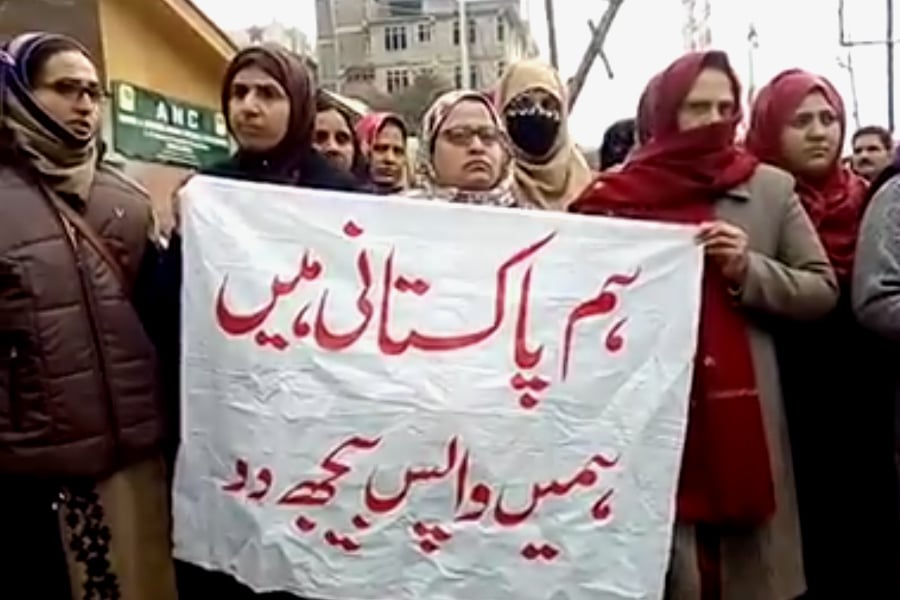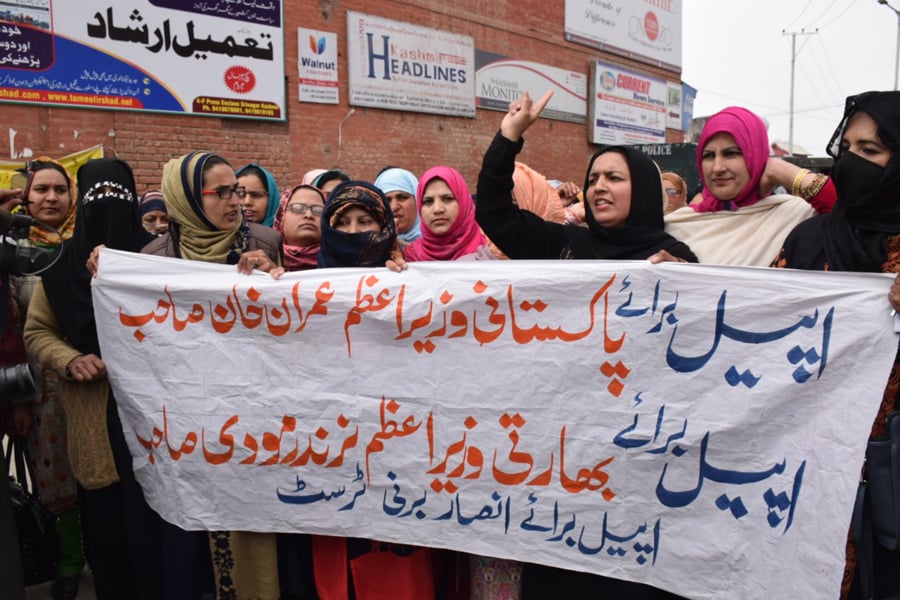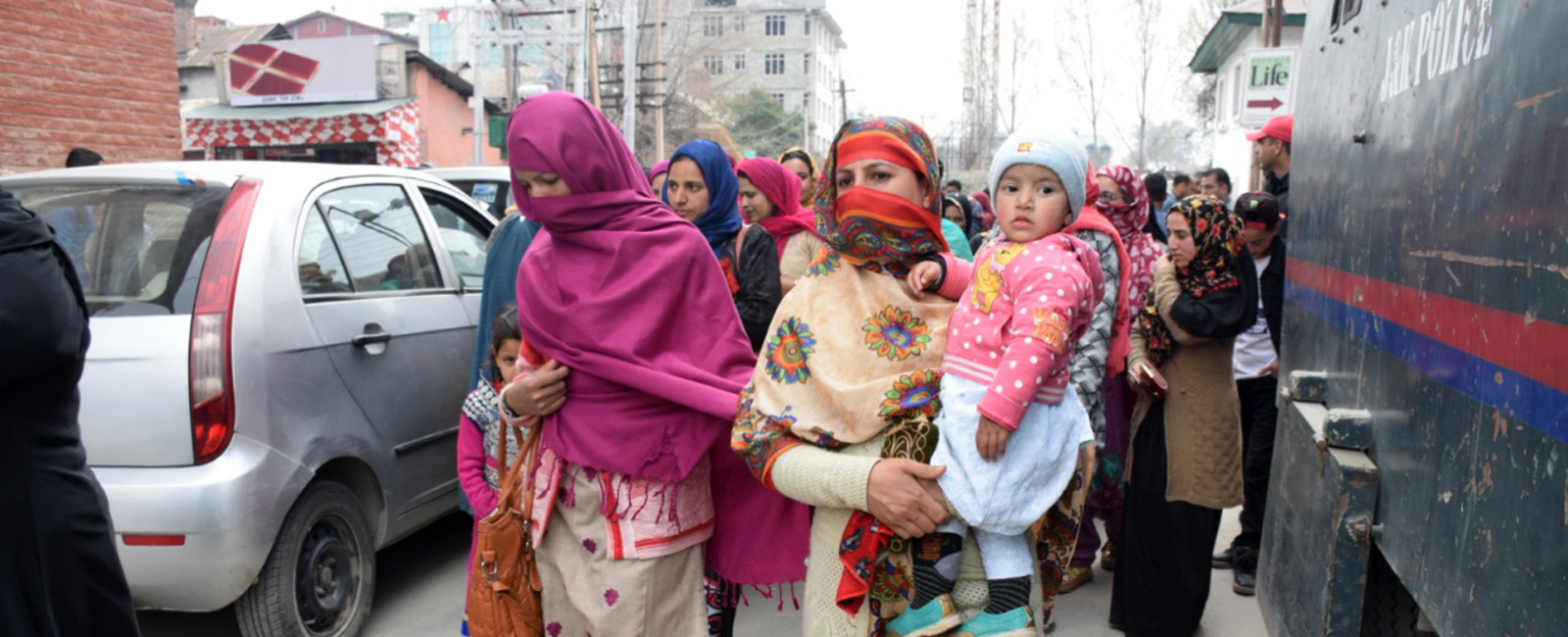In limbo: The story of hundreds of Pakistani women trapped in Indian-occupied Kashmir

“I have now forgotten my daughter’s face,” says Anila*, a mother of seven from Abbottabad as she sobs into her dupatta.
Anila left her daughter in Pakistan before she migrated to India-occupied Kashmir with her husband and other children. She had hoped that with her daughter in Pakistan, she could leave to meet her whenever she wanted. She was wrong.
Anila is among more than 300 women from Pakistan and Azad Jammu and Kashmir who got married into families living in occupied Kashmir.
After moving there with their husbands, these women have been stuck in legal limbo, with their passports reportedly snatched by the Indian government, according to a letter human rights activist Ansar Burney wrote to the UN Secretary General, a copy of which Geo.tv has seen.
“I cannot even speak to her over the phone. In the rare instance that I do, my daughter cries and asks, ‘When are you coming home? When are you coming home?’” Anila says in a video statement shared with Geo.tv by Burney, who is in contact with these women and has been trying for the past two years to bring attention to their plight.
Anila’s husband hails from the disputed territory, but due to the growing violence there in the ‘90s, had left to seek a new life in Pakistan. He and his family went back as part of then chief minister Omar Abdullah’s “Return and Rehabilitation Scheme” in 2010.
Young men who had left the region were assured by the Indian government that they could return to their homeland and take with them their wives and children.
“My daughter is crying over there and I over here,” Anila breaks down once again. “I cannot meet my parents or my child.”
Pausing to wipe her tears, she continues: “We were conned into coming here (Indian-occupied Kashmir). We were promised that the authorities would do something and we would be able to go back home, but so many years have passed that I have been deprived of seeing my daughter or my parents.”
“In this period, so many of my relatives have died, [whom I never met in all this time and whose funerals I was never able to attend],” she adds.
These women have been trying to find a way out of their predicament, initially seeking legal status, and now, a way home in a landscape that is becoming increasingly hostile towards them.

This June, a number of them took to the streets in Srinagar to stage a protest demanding travel documents. “How are we illegal [immigrants] when you invited us to come here and promised we would be able to live with dignity?” asked a woman in the protest.
Amid coronavirus restrictions coupled with the lockdown enforced since August 5 last year, demonstrating in the streets is no easy task. Even the most mundane tasks — like purchasing groceries — risk inviting the wrath of Indian occupation forces. But for some of these women, the violence doesn’t end outside. It follows them home.
Daily beatings
“There are some women who are beaten every day,” Burney tells Geo.tv. He describes the horrifying case of a woman who is not only severely beaten by her husband, but also by her adult stepsons. She is also denied any treatment when she is ill or injured.
In Pakistan, while divorce is taboo for women, there is at the very least legal recourse for women to change their circumstances if they so choose. For the women stuck there, there is none.
“It is very difficult for them to step out of their homes for anything as they have no identity cards. They can get arrested and thrown into jail with their children. They run the risk of being falsely implicated in cases,” Burney says.
There are also a number of women who have been divorced, but their ex-husbands do not allow them to leave the house. “And even if they were to leave, where would they go?” Burney says, citing their Pakistani origin and how precarious things are for “women and children who are considered the enemy” by Indian authorities.
Even worse, the divorcees are also compelled to continue fulfilling their 'marital duties', as Burney delicately puts it.
Others, who are widowed, are living a miserable existence with their in-laws with no end in sight. “Those women are living like slaves,” Burney says.
For many of the women, their troubles began as soon as they set foot in the occupied territory.
‘Either jail or worse’
One woman, who hails from Karachi and left in 2012 with her husband and children with the promise of being able to settle down in occupied Kashmir, says she hadn’t even reached Srinagar when she was arrested.
“My husband and I were arrested and held in Jammu’s Central Jail. My three children were also kept in lockup and were then taken away from me.
“After being jailed for three months, our case continued to be heard in Jammu and we would come down to Srinagar for proceedings. My husband was acquitted in 2018, but I was sentenced to two years imprisonment and fined INR10,000.
"They said afterwards, they would deport me to Pakistan,” she adds.
The deportation never happened.
“Almost all of the women have cases against them,” Burney says. “Many have been in jail — their children have been in jail.
“They have to attend hearings and have been doing so for years. [Ignoring them] is the height of tyranny and oppression,” he adds.
Another woman, who escaped her violent home, now lives at a shelter in held Kashmir. She is regularly hounded by Indian law enforcement, who view her as a “suspicious” person.
“She is constantly chased by the police or the CID because she is Pakistani. They keep calling her and create a lot of difficulties for her,” Burney says.
He continues: “For the women it’s either jail or worse — their lives are in danger the way things are going over there.”

A few who are subjected to domestic violence regularly are able to reach out to Burney to share their pain and sorrow and find some solace in knowing their plight is being heard.
“A drowning man will clutch at a reed even,” remarks Burney sadly. However, many are unable to, and must silently bear this burden. “Entire books can be written on each of the women,” he said, underscoring the wretchedness of their existence.
Depression, suicide and pleas for help
Tahira* began teaching at a school when she moved there with her husband.
One day, as she was going for a picnic with the schoolchildren to the Indian-occupied side of Neelum Valley, she phoned her parents in Abbottabad to tell them. She said she would be going to a place where they could see her from the Pakistani side.
“Her family rushed over to see her. They broke down into tears on their side while Tahira was weeping on her side of the divide,” Burney says, narrating the incident. “Overcome with emotion, she tried to cross over. The Indian army shoved her back.”
Owing to the difficult circumstances, scores of the women have been diagnosed with depression and reports of suicides among such women are a common occurrence, Burney says.
Tahira is undergoing treatment for major depressive disorder. “So many women have ended their lives because of depression,” she says in a video statement. “Because the law has changed, and we are Pakistanis — and Muslims — we cannot get citizenship here.” She requests Pakistani authorities to intervene and help the women return home.
Nisa*, a mother of three from Islamabad, is currently in held Kashmir’s Kupwara district. She, too, travelled with her family to occupied Kashmir as part of the rehabilitation programme. She has since been divorced. “Over the past decade or so, we are in a horrible state. We are neither being granted citizenship nor being accepted.”
Her two sisters are also stuck in Kupwara in similar circumstances. “We request our Pakistani brothers and sisters to raise your voices for us,” Nisa said. “Prime Minister Imran Khan we also appeal to you as daughters of the country. We are your sisters. Please consider our plight.”
The CAA
Burney says the cases of the women and children have been compounded by the Citizenship Amendment Act, a law the Bharatiya Janata Party government passed late last year which, according to Amnesty International, “legitimises discrimination on the basis of religion and stands in clear violation of the Constitution of India and international human rights law”.
Before the CAA, the women had hopes of receiving some form of travel document or even becoming legal because their husbands were documented residents of Indian-occupied Kashmir, but now they have lost all hope. “They have become completely illegal aliens in India’s eyes,” Burney said.
He says with the dead end there, the only path forward the women can see lies with the Pakistani government. “They have attached their hopes to Ansar Burney Trust and the government of Pakistan,” he adds.
‘Charity begins at home’
Ansar Burney and his charity have been giving voice to the women’s struggle. “I have been fighting their case over two years and seeking the government’s attention over this issue,” says the activist.
“These [women] are Pakistani. While we stand up for Kashmiris — we call Kashmir Pakistan’s jugular vein — are we not an unfortunate lot that we aren’t doing enough for these citizens?
“These are our women and children, and we aren’t raising our voices for them,” he laments. “If you cannot even stand up for these people, how can you claim to be a champion of the oppressed people of Kashmir? [Charity] begins at home,” he adds.
He has yet to receive replies from the president and prime minister in this regard, Burney says. After repeated attempts to reach the Ministry of Foreign Affairs, he was informed a couple of weeks ago that the issue is being raised “at the highest levels” with Indian authorities.
Foreign Office responds
When asked about the status of the efforts in resolving the women's issues, Foreign Office Spokesperson Aisha Farooqui told Geo.tv that the ministry is “quite aware of the situation of stranded Pakistani women” in occupied Kashmir.
“We have taken up this matter with the Indian side at the highest level for expeditious repatriation of these women multiple times,” Farooqui says. She adds that the ministry is now awaiting “necessary clearance from the Indian side”.
The spokesperson says that the Pakistani Mission in New Delhi is “constantly in contact with these women as well as the concerned Indian authorities”. “The Ministry continues to follow up the issue with the Indian side at all levels for early repatriation of these women,” she adds.
As the coronavirus pandemic rages across the world, many countries are re-imposing restrictions, much to the chagrin of a lockdown-weary public. But for these women, their lockdown has persisted for more than a decade. One protester told media in Srinagar last month: “Coronavirus has spread all over the world and people are trapped in their houses. See how much pain it has caused. Our quarantine has been in place for more than 15 years.”
*Names changed for the privacy and protection of the women.




